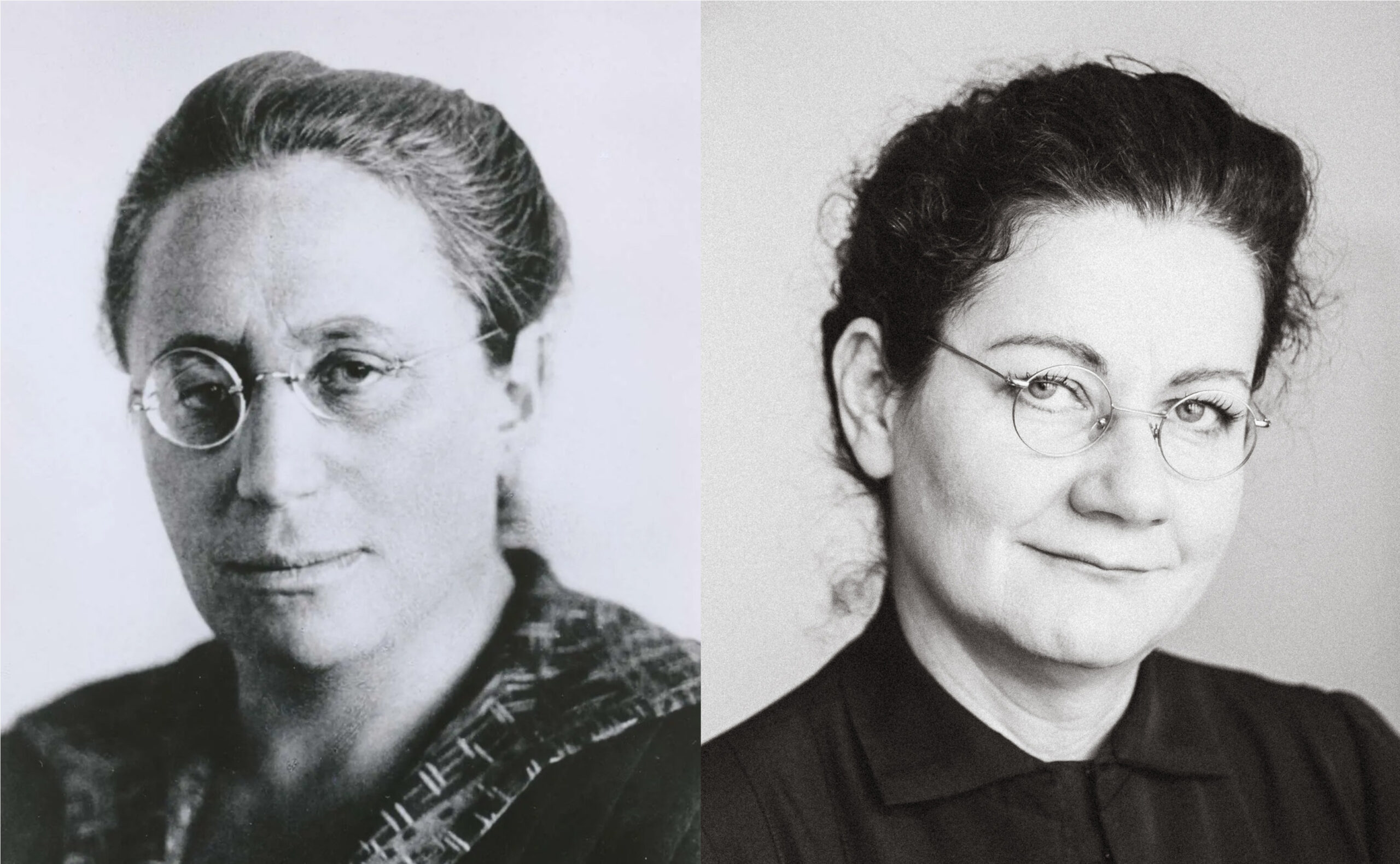
Emmy Noether Takes Center Stage
Just over a year ago on a warm September Saturday, the Harvard Department of Mathematics and the Center of Mathematical Sciences and Applications (CMSA) hosted a unique event celebrating the life and achievements of renowned German mathematician Emmy Noether. Produced by Austrian ensemble portraittheater Vienna and German research university Freie Universität Berlin (FU), “Diving Into Math with Emmy Noether” is a biographical play based on historical documents and events. The multimedia show brings Noether’s fascinating personality to life through a combination of actress Anita Zieher’s performance and videos of dramatized conversations with other leading mathematicians of Noether’s day. The event may have been years in the making—with discussions between Harvard and portraittheater beginning prepandemic—but it was more than worth the wait for the guests lucky enough to attend.
Emmy Noether was one of the most influential mathematicians of the last century. Her works and teachings left a lasting mark on modern algebra, opening new avenues for a modern structural perspective on mathematics. Born in 1882 in Erlangen, Germany, she began her studies in a time when women were only beginning to break down the barriers that prevented them from entering the doors of German universities. Noether worked at the Mathematical Institute of Erlangen for seven years without pay and had to overcome fierce resistance when she applied for the right to teach at the University of Göttingen in 1915. After four years of lecturing under another faculty member’s name, she submitted a thesis in which she solved one of the central problems in Albert Einstein’s general theory of relativity, at last acquiring her habilitation, her certification to teach.
She remained a leading member of the Göttingen mathematics department, where her students became known as the “Noether boys.” Conversational mathematics played an essential part in her work and she inspired many leading figures worldwide, including Pavel Alexandrov, Jean Dieudonné, Hermann Weyl, and Norbert Wiener. When Hitler came to power in 1933, Noether was one of the first Jewish instructors to be dismissed by the Nazi government. She accepted a temporary appointment as a research professor at Bryn Mawr College and moved to the U.S., where she remained until her death in 1935. By that time, her algebraic acumen and her remarkable contributions toward understanding the status of conservation laws in relativity theory were recognized around the world. Following her death, Einstein himself wrote to The New York Times that she was “the most significant creative mathematical genius thus far produced since the higher education of women began.”
Noether’s extraordinary life and accomplishments could not have made her a better candidate for a portraittheater production. The Viennese theater ensemble specializes in bringing the life and work of extraordinary persons, especially women, to the stage. Since 2006, the company has produced plays about historian Hannah Arendt, philosopher and feminist activist Simone de Beauvoir, and physicist Marie Curie, among others. “We were performing a new play about the physicist Lise Meitner at the Universität Berlin in 2018, and Mechthild Koreuber came to see it,” recalled portraittheater director Sandra Schüddekopf. Mechthild, a historian of mathematics, author of a standard study of Noether’s career, and chief gender equality officer at FU, had just organized a conference celebrating the 100th anniversary of Noether’s habilitation. “She asked whether we would consider making a play about Emmy Noether,” Schüddekopf said.
In preparing for their plays, portraittheater frequently cooperates with scientific advisors for an accurate representation of their fields of work. For “Diving Into Math with Emmy Noether,” the company utilized Mechthild and David Rowe, a historian and mathematician from Mainz University. Following the play’s successful debut in 2019, the ensemble considered bringing the performance to the U.S. After all, Noether had spent a part of her academic career there. When the pandemic struck, Rowe and Schüddekopf worked to translate the play from German, while Anita Zieher learnt to portray Noether in English.
“We worked to create a text that would meet the expectations of mathematicians as well as a general audience unfamiliar with mathematics,” Zieher said. Although she is the only person on stage during the performance, she doesn’t consider it a one- person show. “We show video sequences in the play in which Emmy is talking with mathematicians Bartel Leendert van der Waerden, Helmut Hasse, Pavel Alexandrov, and Olga Taussky-Todd,” she said. “These sequences are really important for understanding the attitude and methods of Emmy Noether, who loved doing mathematics not in isolation, but in dialogue with colleagues.”
Ironically, the forced isolation of the pandemic pushed portraittheater’s U.S. tour back by years “It was hard to postpone twice,” Schüddekopf said. “We were more than happy to finally be able to go on tour with the Noether play.” Rowe was particularly tenacious in putting together the schedule that eventually brought the performance to Harvard’s Student Organization Center at Hilles (SOCH).
A lively panel discussion preceded the play and brought additional excitement to the event. The panelists included Rowe and Emmy Noether’s grandniece, Monica Noether, as well as Harvard Mallinckrodt Professor of Physics Melissa Franklin and Harvard Gerhard Gade University Professor Barry Mazur. The performance was followed by a reception, where guests got the chance to mingle and meet members of the ensemble. “We loved meeting Emmy’s grandniece and being addressed as “Tante Emy,”” said Zieher. “So many guests lingered on to share their excitement over the play and congratulate us on our show.” Schüddekopf’s favorite moment of the night was when she overheard Mazur sharing how much he had enjoyed the performance without realizing that Zieher, unrecognizable out of her “Emmy Noether” costume, was standing right beside him.
This article is a part of the 2022-2023 Harvard Math Newsletter.